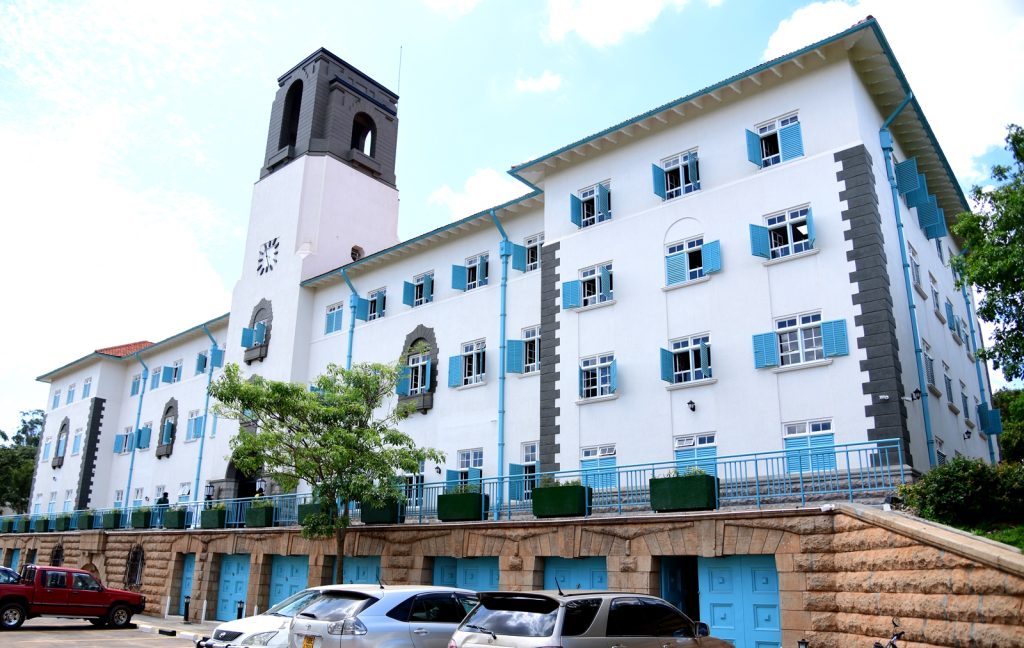SoL Hosts a National Dialogue on the State of Policing in Uganda
The Public Interest law Clinic in the School of Law in conjunction with Human Rights Network-Uganda (HURINET-U) and The Network of Public Interest Lawyers (NETPIL) on Friday 17th November 2017convened a National Dialogue on the State of Policing in Uganda at the St Francis Students Centre in Makerere University.
Organized on the theme: The Search for a Democratic and Accountable Police Service in Uganda: Milestones and Challenges since Independence’’,the event attracted the participation of the academia, civil society organizations, Government agencies, and the student community.
Mr. David Pulkol, the retired external security organization chief gave a key note address where he indicated that the theme of the dialogue clearlyarticulates the idea of what we are looking for, which is a professional and responsive police.
He noted that the title police force rather than police service is an indicator that mercenaries have taken over the police to make money and not to serve. The police should be concerned with citizen security, freedom from all the physical things that can harm them, he noted.
Citing numerous areas where there is commendable work, Mr. Pulkol however observed that there were a few departments that were giving a bad name to the police with a lot of external interferences in the form of orders from above. He noted that police is very relevant in every democratic state but should be seen to operate within the ambits of the law.
He observed that there were a number of strides taken and milestones realized by the police, these needed to be celebrated, despite the fact thatthe Police still faces challenges which in turn affect the realization of the rule of law in the country. He pointed out police excesses especially the infringement on Human rights which makes the police fall short of expectations.
Mr. Pulkol said the National dialogue was long overdue given the occurrences like the unexplained murders in Nansana and Entebbe, the sheikhs and military officers as well as the reported torture and the use of the militia groups to execute police functions. A conversation like this would help refocus on the police we want that is accountable, responsive and one that respects human rights, he added.
The dialogue comprised of panelists Emilian Kayima, the Police Spokesperson, Mr. Norbert Mao, President of the Democratic Party, Ms. Ruth Sekindi from Uganda Human Rights Commission. Others were Hon. Muwanga Kivumbi, the Member of Parliament for Kampala and Ms. Irene Ovonji Odida.
In his submission, Mr. Robert Mao noted that police serves the interests of the dominant class and this can be seen from the locations of the police barracks all over Uganda. He said the police is making all efforts to play their roles but pointed out the challenges they face that include improper housing and facilitation, lack of career progression avenues for the graduate entrants, the mode of recruitment especially in the top positions which is also questionable, the issue of vigilantism within police, inadequate training, skills and equipment were identified as areas incapacitating the police.
In the heated discussions that ensured, there was general consensus that the police were making all efforts to undertake their function despite the numerous challenges. It was noted that the police faces challenges like political control, imprisonment and oppression, police brutality and inadequate training especially for the lower cadres of police staff. These are coupled with insufficient transport to effectively engage the communities, insufficient information and information technology to support police operations and investigations, as well as substandard police infrastructure.
As a way forward, some proposals were made for instance the institution of a police pension fund, turning the idle police land into real estate to raise funds, restoration of the special branch department of police among others in an effort to make it more professional.
Speaking on behalf of the Principal School of Law Dr. Christopher Mbazira, the NETPIL coordinator Mr. Arthur Nsereko said the School of Law was privileged to host such an event of national importance, more so since the issues discussed affect a big section of the community in Uganda.
He commended the Democratic Governance Facility (DGF) and Human Rights Network –Uganda for the logistical support in organizing for the event. He said the Public Interest Law Clinic in the School of Law has spearheaded the change of the teaching methodologies to more practical ways that include public discourses and dialogue on issues of importance.
The event saw the launch of a study on the state of Policing in Uganda conducted by the Human Rights Network –Uganda (HURINET-U)
By Harriet Musinguzi



